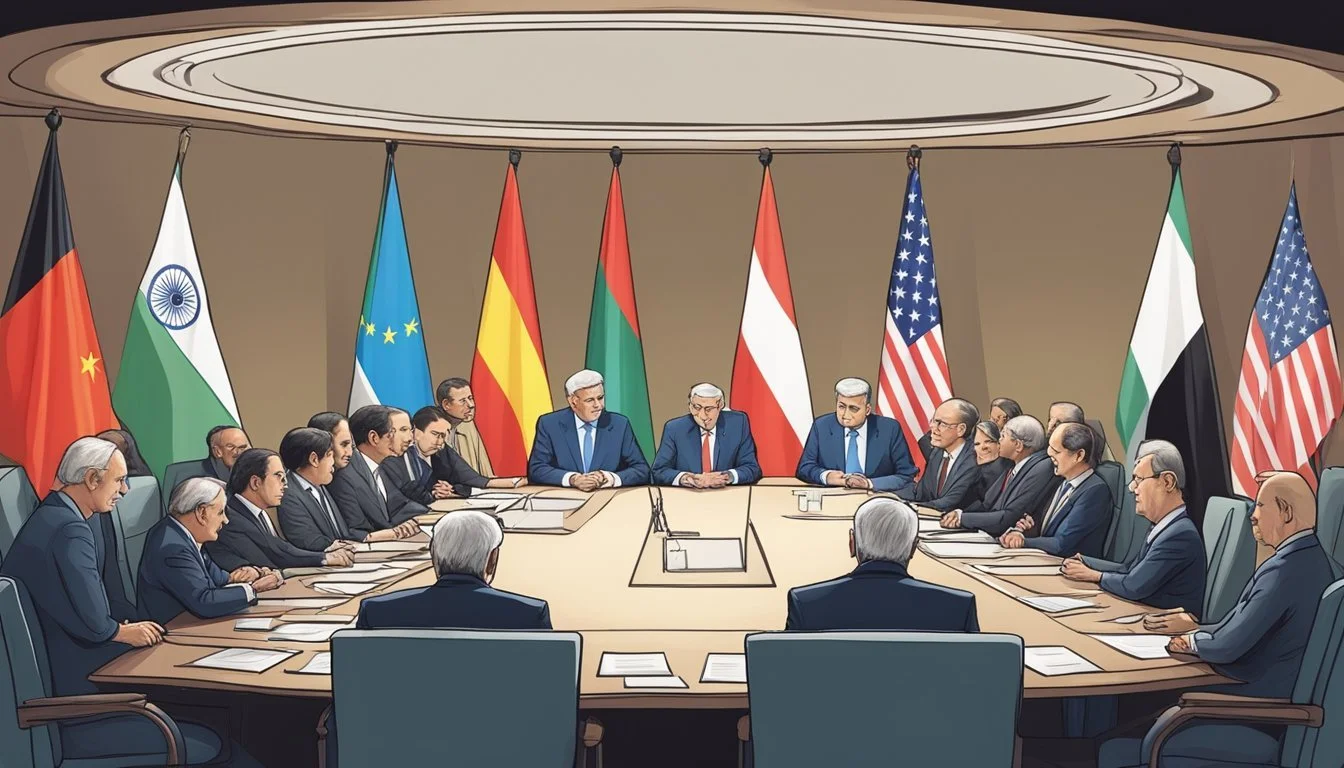Camp David Accord: 7 Documentaries on a Middle East Breakthrough
Exploring the Historic 1978 Peace Agreement
The Camp David Accords marked a pivotal moment in Middle Eastern history. This diplomatic breakthrough brought together the leaders of Israel and Egypt in 1978, laying the groundwork for a peace treaty between the two nations. The accords, signed at the presidential retreat in Maryland, represented a significant step towards stability in a region long plagued by conflict.
Numerous documentaries have explored the complex negotiations and personalities involved in this historic agreement. These films offer viewers insights into the high-stakes diplomacy, political maneuvering, and personal relationships that shaped the outcome of the Camp David talks. Through archival footage, interviews, and expert analysis, they provide a deeper understanding of this watershed moment in international relations.
1) "The Battle for Peace: An In-Depth Look at the Camp David Accords" by History Channel
This documentary provides a comprehensive examination of the historic Camp David Accords. It explores the complex negotiations between Egyptian President Anwar Sadat and Israeli Prime Minister Menachem Begin, facilitated by U.S. President Jimmy Carter.
The film showcases rare archival footage and interviews with key participants. It offers viewers insight into the intense 13-day summit at Camp David in 1978 that led to the groundbreaking peace agreement between Egypt and Israel.
Experts and historians provide context, explaining the geopolitical tensions and the high stakes involved. The documentary highlights the personal dynamics between the leaders and the challenges they faced in reaching a compromise.
"The Battle for Peace" also examines the long-term impact of the accords on Middle Eastern politics. It presents a balanced view of the agreement's successes and limitations in fostering regional stability.
2) "Camp David: The Secret History of the Accords" by Al Jazeera
Al Jazeera's documentary "Camp David: The Secret History of the Accords" offers a comprehensive look at the historic 1978 peace agreement. The film explores the behind-the-scenes negotiations that led to the landmark treaty between Egypt and Israel.
Through interviews with key participants and archival footage, the documentary reveals the intense diplomatic efforts of President Jimmy Carter. It showcases his role in mediating between Egyptian President Anwar Sadat and Israeli Prime Minister Menachem Begin.
The film delves into the personal dynamics between the leaders and the challenges they faced during the 13-day summit. It highlights the moments of tension and breakthrough that ultimately resulted in the groundbreaking accord.
"Camp David: The Secret History of the Accords" provides valuable insights into the complex geopolitical landscape of the Middle East at the time. The documentary examines the impact of the agreement on regional politics and its lasting significance in shaping Arab-Israeli relations.
3) "Peace at Camp David: The Inside Story of Middle East Diplomacy" by PBS
This PBS documentary offers a detailed look at the historic Camp David Accords. It examines the pivotal 1978 negotiations between Egyptian President Anwar Sadat and Israeli Prime Minister Menachem Begin.
The film features interviews with key participants, including former U.S. President Jimmy Carter. It provides insights into the intense diplomatic efforts that led to the groundbreaking peace agreement.
Viewers gain a behind-the-scenes perspective on the 13-day summit at the presidential retreat. The documentary explores the challenges faced by negotiators and the strategies employed to reach a compromise.
"Peace at Camp David" highlights the personal dynamics between the leaders and their advisors. It sheds light on the moments of tension and breakthrough that shaped the final outcome.
The film also considers the long-term impact of the accords on Middle East relations. It offers a balanced assessment of the agreement's successes and limitations in the years following its signing.
[https://www.pbs.org/wgbh/americanexperience/films/camp-david/]
4) "From War to Peace: The Path to the Camp David Accords" by National Geographic
National Geographic's documentary offers a comprehensive look at the events leading to the Camp David Accords. It chronicles the tensions between Israel and Egypt following the Six-Day War in 1967.
The film explores the diplomatic efforts of U.S. President Jimmy Carter, who invited Egyptian President Anwar Sadat and Israeli Prime Minister Menachem Begin to Camp David. It details the intense negotiations that took place over 13 days in September 1978.
Through archival footage and expert interviews, the documentary highlights the key issues discussed during the summit. These included the status of the Sinai Peninsula and the Palestinian territories.
The film showcases the personal dynamics between the leaders and their advisors. It reveals how Carter's persistence and mediation skills helped bridge seemingly insurmountable differences.
"From War to Peace" provides insight into the compromises made by both sides to reach an agreement. The documentary concludes with the signing of the Accords and their immediate impact on Middle East relations.
National Geographic "From War to Peace: The Path to the Camp David Accords" Documentary
5) "Camp David: An American Summit for Middle East Harmony" on ABC News
ABC News produced this documentary to chronicle the 1978 Camp David Summit. The film provides a detailed account of the negotiations between Egyptian President Anwar Sadat and Israeli Prime Minister Menachem Begin, facilitated by US President Jimmy Carter.
The documentary features interviews with key participants and behind-the-scenes footage. It offers viewers a glimpse into the tense atmosphere and complex dynamics of the summit.
Archival material and expert commentary help contextualize the historical significance of the Camp David Accords. The film explores the motivations and concerns of each leader involved in the negotiations.
Viewers gain insight into the diplomatic strategies employed during the summit. The documentary also highlights the role of President Carter as a mediator between the two Middle Eastern leaders.
The film examines the immediate outcomes of the summit and its long-term impact on Middle East relations. It serves as a valuable resource for those interested in diplomatic history and Middle Eastern politics.
6) "Negotiating Peace: Carter's Historic Camp David Talks" by BBC
The BBC documentary "Negotiating Peace: Carter's Historic Camp David Talks" offers a comprehensive look at the landmark 1978 summit. It explores the intense negotiations between Egyptian President Anwar Sadat and Israeli Prime Minister Menachem Begin, facilitated by U.S. President Jimmy Carter.
The film features interviews with key participants and experts, providing insights into the complex dynamics at play during the talks. It examines the challenges faced by the leaders as they worked to overcome decades of conflict and mistrust.
Archival footage and photographs bring the historic event to life, showcasing the tension and eventual breakthrough moments. The documentary highlights Carter's pivotal role in bridging gaps between the two sides and pushing for a resolution.
Viewers gain a deeper understanding of the political and personal stakes involved in the negotiations. The film also explores the immediate aftermath of the accords and their lasting impact on Middle East relations.
"Negotiating Peace" offers a balanced perspective on this crucial moment in diplomatic history, shedding light on the complexities of achieving peace in a volatile region.
BBC Documentary - Negotiating Peace: Carter's Historic Camp David Talks
7) "The Architects of Peace: Camp David Accords" by CNBC
CNBC's documentary "The Architects of Peace: Camp David Accords" offers a comprehensive look at the historic 1978 agreement. The film explores the roles of key figures involved in the negotiations, including U.S. President Jimmy Carter, Egyptian President Anwar Sadat, and Israeli Prime Minister Menachem Begin.
The documentary provides insight into the intense 13-day summit at Camp David. It details the challenges faced by the negotiators and the strategies employed to overcome seemingly insurmountable differences.
Interviews with diplomatic staff and advisors present at the talks add depth to the narrative. These firsthand accounts offer viewers a behind-the-scenes perspective on the tense negotiations and moments of breakthrough.
"The Architects of Peace" examines the long-term impact of the accords on Middle East relations. It analyzes the agreement's successes and limitations in the context of ongoing regional conflicts.
The film uses archival footage and photographs to bring the historic event to life. These visual elements help viewers understand the significance of the Camp David Accords in shaping modern Middle Eastern diplomacy.
Historical Context
The Camp David Accords emerged during a tumultuous period in Middle Eastern history. Decades of conflict and failed negotiations set the stage for this pivotal diplomatic breakthrough.
Prelude to Peace: The 1970s Middle East Landscape
The 1970s Middle East was marked by ongoing tensions between Israel and its Arab neighbors. The 1973 Yom Kippur War had shaken the region, leading to an oil embargo and global economic repercussions.
Egypt, under President Anwar Sadat, began to shift its stance towards Israel. Sadat's historic visit to Jerusalem in 1977 signaled a willingness to pursue peace.
Meanwhile, Israel, led by Prime Minister Menachem Begin, faced security challenges and sought stability.
Key Players and Political Dynamics
The Camp David negotiations involved three primary figures: U.S. President Jimmy Carter, Egyptian President Anwar Sadat, and Israeli Prime Minister Menachem Begin.
Carter, committed to Middle East peace, played a crucial mediating role. His persistence and diplomatic skills were instrumental in bridging gaps between the parties.
Sadat, seeking to regain the Sinai Peninsula and improve Egypt's economy, took bold steps towards reconciliation. His decision to engage directly with Israel was controversial among Arab states.
Begin, a hardliner, aimed to ensure Israel's security while facing domestic political pressures. His willingness to negotiate marked a significant shift in Israeli policy.
These leaders' personal dynamics and political calculations shaped the complex negotiations that led to the Accords.
Impact and Legacy
The Camp David Accords profoundly shaped Middle Eastern politics and global perceptions of the Arab-Israeli conflict. This historic agreement altered regional dynamics and sparked intense media coverage.
Political and Social Repercussions in the Middle East
Egypt's recognition of Israel sparked outrage across the Arab world. The country faced diplomatic isolation and was suspended from the Arab League. This move strained Egypt's relationships with other Arab nations for years.
The accords also influenced Palestinian politics. Many Palestinians felt betrayed by Egypt's separate peace with Israel. This sentiment strengthened support for more radical Palestinian factions.
For Israel, the agreement brought a degree of legitimacy and reduced its regional isolation. It also set a precedent for future peace negotiations with other Arab states.
The Role of Media in Shaping Public Opinion
Media coverage of the Camp David summit was extensive and influential. Television broadcasts brought the negotiations into people's homes, personalizing the diplomatic process.
Images of Carter, Begin, and Sadat shaking hands became iconic symbols of potential peace. These visuals helped generate public support for the accords in the United States and beyond.
However, media portrayals varied significantly across different countries. In some Arab nations, coverage was more critical, reflecting government opposition to the agreement.
The intense media focus on Camp David also raised public expectations for Middle East peace. This heightened attention would influence future negotiations and peace initiatives in the region.



